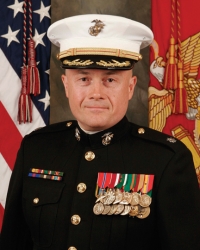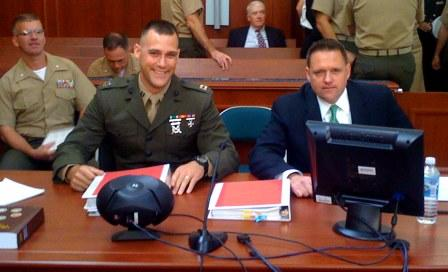 On December 5, 2011, AFLC Co-Founder and Senior Counsel Robert Muise filed a federal lawsuit against the U.S. Department of State for failing to provide records in its possession concerning an insurgent attack against U.S. Marines in Haditha, Iraq on November 19, 2005. [Read a copy of the complaint here].
On December 5, 2011, AFLC Co-Founder and Senior Counsel Robert Muise filed a federal lawsuit against the U.S. Department of State for failing to provide records in its possession concerning an insurgent attack against U.S. Marines in Haditha, Iraq on November 19, 2005. [Read a copy of the complaint here].
Muise was the lead civilian counsel who successfully defended Lt. Col. Jeffrey Chessani, USMC, against criminal charges brought as a result of this attack. The charges against Lt. Col. Chessani were dismissed on the grounds of unlawful command influence. The government appealed the lower military court’s ruling, and Muise successfully defended the dismissal on appeal before the U.S. Navy-Marine Corps of Criminal Appeals (NMCCA) in Washington, D.C. [Read a copy of that decision here].

At the time of the insurgent attack, Lt. Col. Chessani was commander of Third Battalion, First Marines and responsible for approximately 2,000 American and Iraqi forces. At about 7:15 in the morning of November 19, 2005, a squad of Lt. Col. Chessani’s Marines was leading a resupply convoy when it was ambushed by a command-detonated IED and small arms fire from nearby houses. The road-side bomb detonated under a Humvee, instantly killing one Marine and injuring two others. A house-to-house battle between insurgents and an out-numbered 4-man Marine “fire team” and an ensuing day-long battle with the insurgents resulted in the deaths of 24 Iraqis, including 15 civilians. A remote-controlled aircraft captured the insurgents on video firing and throwing hand grenades at the Marines.
The decision to launch a criminal investigation of the November 19 incident was made three months after its occurrence as a result of an erroneous and inflammatory Time magazine news story, which military commanders in the field suspected was instigated by terrorist propaganda. The news story referred to the Haditha incident as a “massacre” perpetrated by the Marines.
The political nature of the criminal process was further reinforced when months before the investigation was completed, now-deceased Congressman John Murtha, an outspoken anti-war critic and chairman of the House military appropriations subcommittee, publicly accused the Marines of killing in “cold blood” and high ranking officers of “covering it up.” Murtha is the same person caught on tape negotiating bribes with Arab Sheiks during the FBI’s 1980 Abscam investigation—he was an un-indicted coconspirator in that case.
As the evidence in the case showed, higher echelon commanders were monitoring the action as it was taking place through radio traffic and remote controlled aircraft. Yet, none of these commanders saw the need for further investigation. Loss of civilian life was considered a tragic but not uncommon occurrence in a war against insurgents who purposely placed civilians in harm’s way.
On October 29, 2009, a request under the Freedom of Information Act was made for production of records of an investigation of the incident conducted by the Iraqi government. During a televised interview, an Iraqi official stated that her government had turned over a complete investigative file on what happened in Haditha on November 19, 2005 to the U.S. Government. The State Department failed to comply with the request.
The government records sought in the federal lawsuit are paramount to understanding and assessing the United States government’s investigation and subsequent prosecution of Lt. Col. Chessani. As noted above, these proceedings resulted in the dismissal of all criminal charges on the basis of unlawful command influence. Moreover, in addition to the criminal court-martial proceedings, Muise also successfully represented Lt. Col. Chessani in a subsequent Board of Inquiry (“BOI”), which was an administrative proceeding brought against him in December 2009, following the dismissal of the criminal charges. Having failed to criminally prosecute Lt. Col. Chessani, the government was now seeking to have him dismissed from service without his hard-earned retirement. The government failed at this attempt as well. Lt. Col. Chessani, a devout Christian and father of 7 children, is now retired with full pay and benefits.
The government records sought by the FOIA lawsuit would no doubt have assisted in the defense of Lt. Col. Chessani and potentially exonerated him of all wrongdoing. The request asked for the following:
1. The investigative file and all reports, writings, notes, documents, memoranda, emails, or photographs, presented by the Iraqi Government relating to what happened in Haditha, Iraq on the morning of November 19, 2005. This request specifically refers to the complete file that was presented to the United States Government according to the statements made by Wijdan Mikhail Salim, the Iraqi Human Rights Minister. Specifically, Wijdan Mikhail Salim made an on-camera statement that the Iraqi government presented a complete investigative file on what happened in Haditha, Iraq on November 19, 2005, to the United States Government. Said investigative file is requested in both its original language and the English translation.
2. All records, reports, writings, notes, documents, memoranda, emails, or other statements relating to the response of the United States Government to the investigative file presented to it by the Iraqi Government relating to the November 19, 2005, incident that occurred in Haditha, Iraq.
As noted previously and in the FOIA request, during a televised documentary on the Haditha incident, Wijdan Mikhail Salim, the Iraqi Human Rights Minister at the time, made an on-camera statement confirming the existence of the requested investigative file and that the file was in the possession of the United States government. Upon information and belief, the investigatory file is in the possession, custody, and control of the State Department.
Having had ample time to comply with FOIA, the State Department has still not provided a substantive response, so the lawsuit was filed to compel production of the records.
UPDATE (March 9, 2012): As a result of the lawsuit, the State Department released its first set of records, which indicate that the Iraqi Human Rights Minister Wijdan Mikhail Salim was pressuring the United States to pursue the Haditha prosecutions. Read those documents here.
